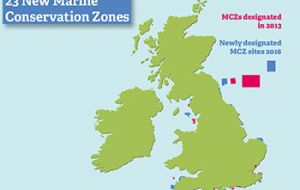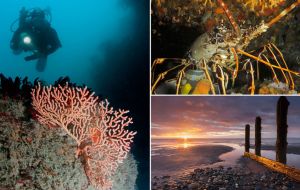MercoPress. South Atlantic News Agency
The “Blue Belt” of English waters is now Marine Conservation Zones
 The new MCZs will cover areas from as far north as Farnes East off the coast of Northumberland down to Land’s End in the South West
The new MCZs will cover areas from as far north as Farnes East off the coast of Northumberland down to Land’s End in the South West  The MCZs will protect 45 different types of habitat, geological features and fascinating species - including stalked jellyfish and spiny lobsters.
The MCZs will protect 45 different types of habitat, geological features and fascinating species - including stalked jellyfish and spiny lobsters.  “It’s vital that we protect our marine environment to ensure our seas remain healthy, our fishing industry remains prosperous” said Minister George Eustice
“It’s vital that we protect our marine environment to ensure our seas remain healthy, our fishing industry remains prosperous” said Minister George Eustice  ”We will continue to work with government to achieve the much-needed ambitious and comprehensive third and final tranche,” affirmed Joan Edwards
”We will continue to work with government to achieve the much-needed ambitious and comprehensive third and final tranche,” affirmed Joan Edwards The 23 new Marine Conservation Zones (MCZs) announced by UK Marine Environment Minister, George Eustice, bring the total to 50 marine protected areas, which now cover more than one fifth of English waters. The ‘Blue Belt’ now comprises over 20% of English waters granting vital protection for the diverse array of wildlife in the country’s seas.
The new MCZs will cover areas across the country from as far north as Farnes East off the coast of Northumberland down to Land’s End in the South West, and will protect 45 different types of habitat, geological features and fascinating species - including stalked jellyfish and spiny lobsters.
The minister said, “As an island nation, the UK is surrounded by some of the richest and most diverse sea life in the world - from the bright pink sea-fan coral colonies off the south-west coast, to the great chalk reef stretches in the east. It’s vital that we protect our marine environment to ensure our seas remain healthy, our fishing industry remains prosperous and future generations can enjoy our beautiful beaches, coastline and waters”.
The 23 additional sites are the second of three planned phases of MCZs; the first phase covered 3,731 square miles of water over 27 sites, while a third phase of proposed MCZs will be put out to wider public consultation in 2017, and designated in 2018.
The announcement has also been welcomed by a number of campaign groups.
“Marine protection is vital to us all, no matter where we live. Our seas provide the oxygen for every second breath we take, the fish on our plates and so much more. The designation of 50 Marine Conservation Zones to date is a strong step forward but there is much still to do. It is vital that appropriate management is implemented as soon as possible. We will continue to work with government to ensure that this happens and to achieve the much-needed ambitious and comprehensive third and final tranche,” Joan Edwards, The Wildlife Trusts’ head of Living Seas, said.
Natural England and the Joint Nature Conservation Committee (JNCC) provided the environmental advice and evidence that underpins these designations.
Natural England Chairman, Andrew Sells, noted, “This is a fantastic outcome for the marine environment and brings us a great step closer to achieving the ambition of a ‘Blue Belt’ – a network of marine areas protecting wildlife surrounding the UK.”
Meanwhile, JNCC Chief Executive Marcus Yeo, stressed, “This is another major step forward in protecting the diverse range of habitats and species found in the seas around England. JNCC look forward to working with public authorities to achieve effective management of the new sites.” (FIS).




Top Comments
Disclaimer & comment rulesCommenting for this story is now closed.
If you have a Facebook account, become a fan and comment on our Facebook Page!